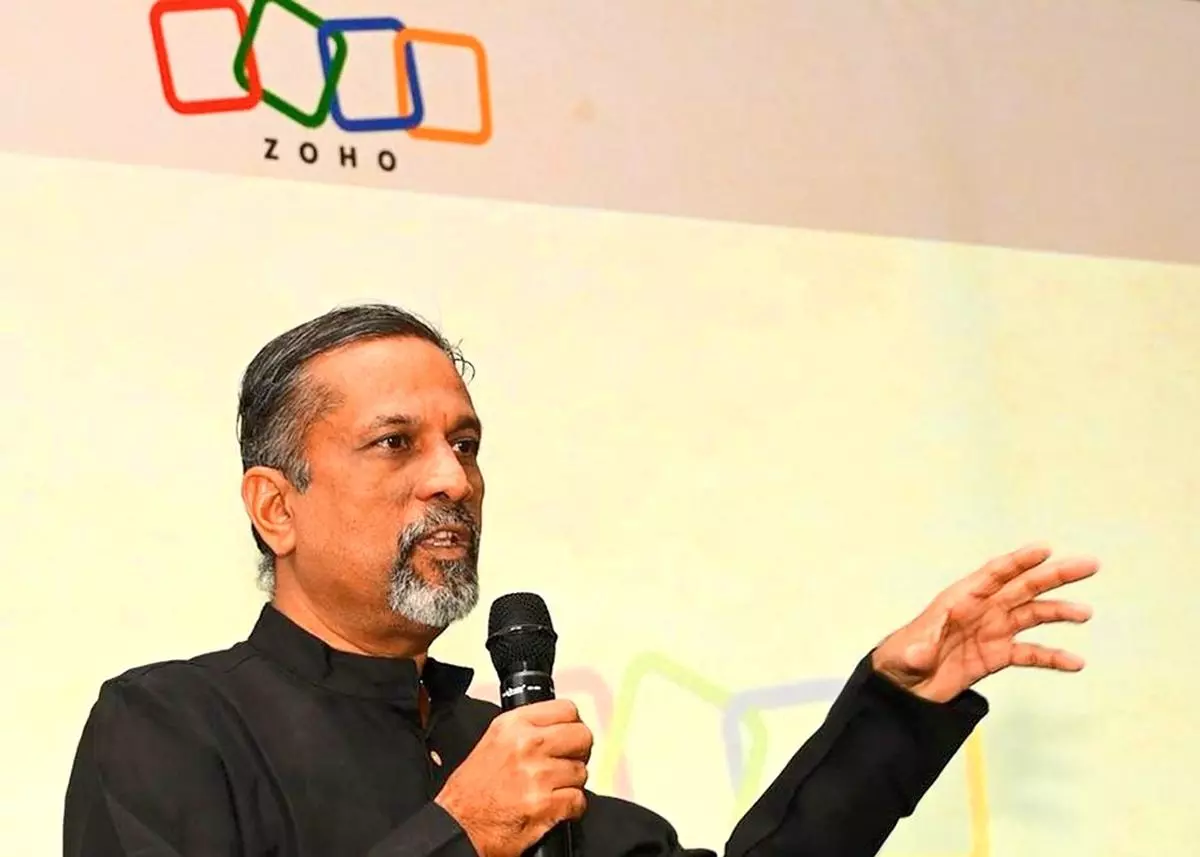From Village Roots to Global Heights: The Extraordinary Tale of Sridhar Vembu

Few narratives in the histories of business genius really inspire the imagination like Sridhar Vembu’s.
His journey from the serene paddy fields of Thanjavur, Tamil Nadu, to creating a 9,000 crore rupee technology empire without a single rupee of external funding stands as a masterclass in sustainable business building. While Silicon Valley’s narrative often glorifies the venture capital-fueled rocket ship, Vembu’s story offers a refreshing alternative—a testament to patient capital, long-term vision, and unwavering self-belief.
Sridhar Vembu’s academic brilliance manifested early, securing an astonishing 27th rank in the fiercely competitive IIT-JEE examination. This intellectual prowess carried him through the prestigious halls of IIT Madras and later to Princeton University in the United States. By 1994, he had established himself as a wireless engineer at Qualcomm—a position that promised stability, prestige, and financial security. For many, this would represent the pinnacle of professional achievement, but Vembu harbored entrepreneurial ambitions that transcended conventional success.

Opportunity knocked when his brothers established a fledgling software company in Chennai, coinciding with an IIT Madras friend’s development of promising networking software. Sridhar Vembu recognized the potential synergy—his brothers’ technical capabilities could be combined with his friend’s innovation, while his American presence could open doors to lucrative Western markets. This realization prompted a decision that many would consider reckless: abandoning his well-compensated position at Qualcomm to establish AdventNet in 1996.
The company’s initial focus was refreshingly straightforward—developing and selling specialized software to telecom providers. Their first offering, Web NMS, provided businesses with digital operation management capabilities. The product’s excellence was validated when it outperformed solutions from industry titan Hewlett-Packard at a major U.S. technology fair—an early indication of the David versus Goliath narrative that would characterize Vembu’s career.
By 1998, AdventNet had achieved respectable sales of 6 crore rupees, with Sridhar Vembu assuming the CEO position. The company’s trajectory accelerated dramatically in 2000 when it secured networking behemoth Cisco as a client, catapulting sales to 50 crore rupees. This rapid growth naturally attracted investor attention, with one potential backer offering 50 crore rupees at a 700 crore rupee valuation—a proposition that would have made Vembu wealthy overnight.
In what would become a defining characteristic of his business philosophy, Sridhar Vembu declined the investment. This wasn’t mere stubbornness but rather a profound understanding that he was constructing a generational enterprise, not a short-term venture designed for quick exits. This long-term perspective would be tested severely the following year when the dot-com bubble burst with devastating consequences.

The market collapse decimated AdventNet’s customer base, which contracted catastrophically from 150 clients to just three. As countless technology companies imploded around them, an investor approached Sridhar Vembu with an offer to acquire the company for 150 crore rupees—a substantial sum that would have represented a graceful exit from increasingly treacherous market conditions. Once again, Vembu declined, displaying remarkable conviction in his vision despite the challenging environment.
What followed demonstrated Vembu’s exceptional leadership qualities. Drawing on carefully accumulated cash reserves, he maintained full salary payments to all 115 engineers, personally forgoing his compensation for four years. This employee-first approach fostered deep loyalty while preserving the technical expertise necessary for the company’s evolution. Simultaneously, he engineered a strategic pivot toward ManageEngine, an IT management tool tailored for mid-sized enterprises. This repositioning proved inspired, ultimately securing adoption by an impressive 60% of Fortune 500 companies.
During this period of reinvention, Sridhar Vembu acquired the domain name “Zoho” from a hospitality company that had perished in the dot-com implosion. This seemingly minor transaction would have profound implications, as the Zoho brand became synonymous with the company’s most transformative offering—Zoho CRM, launched in 2005. This customer relationship management platform represented a direct challenge to established players in a rapidly expanding market.
The product’s value proposition resonated powerfully with users, attracting one million customers by August 2008. This success catalyzed broader corporate evolution, with AdventNet formally rebranding as Zoho Corporation in 2009 while expanding its portfolio to encompass 25 product offerings and 50 mobile applications. By 2015, the user base had swelled to 12 million, driving sales to 1,800 crore rupees.
Zoho’s rise inevitably disturbed established industry players. Most notably, the company offered comparable functionality to Salesforce at approximately one-sixth the cost. In a vindication of Vembu’s vision, Salesforce—the very giant he had challenged—approached with acquisition overtures. Consistent with his prior decisions, Sridhar Vembu declined, preferring independence to integration.

With innovative freemium offerings and a workforce that had grown to 5,000 employees, Zoho achieved a pivotal milestone on November 8, 2021, reporting revenues of 5,230 crore rupees and officially joining the elite club of billion-dollar companies measured by revenue rather than speculative valuations. Even more remarkably, the company flourished during the pandemic, generating revenues of 6,711 crore rupees and profits of 1,918 crore rupees when countless businesses struggled for survival.
Today, Zoho stands as a global software powerhouse with revenues of 8,700 crore rupees and profits of 2,800 crore rupees. The company’s growth has established it among the world’s most significant software enterprises—all without raising a single rupee of external funding throughout its 27-year journey. This achievement represents a powerful rebuke to conventional Silicon Valley wisdom regarding the necessity of venture capital for substantial technology growth.
Perhaps most fascinating is Sridhar Vembu’s personal response to this extraordinary success. Despite amassing a personal fortune estimated at 28,000 crore rupees, he maintains a lifestyle of remarkable simplicity. He continues to reside in his native Thanjavur village, famously commuting by bicycle rather than luxury vehicles. This deliberate modesty reflects a deep-seated value system that prioritizes purpose over ostentation and impact over image.
Sridhar Vembu’s journey offers profound lessons for aspiring entrepreneurs. His repeated rejection of external investment demonstrates that bootstrapping remains a viable path even in capital-intensive sectors. His willingness to pivot during market turbulence illustrates the importance of adaptability. His personal sacrifices during challenging periods exemplify servant leadership. And his ongoing commitment to simplicity despite extraordinary wealth suggests that true success transcends financial metrics.
In an era where entrepreneurial narratives often emphasize rapid scaling, quick exits, and venture capital relationships, Sridhar Vembu stands as a compelling counterexample—proving that patient capital, authentic values, and unwavering vision can create enduring enterprises capable of reshaping global industries while remaining true to their founding principles.




